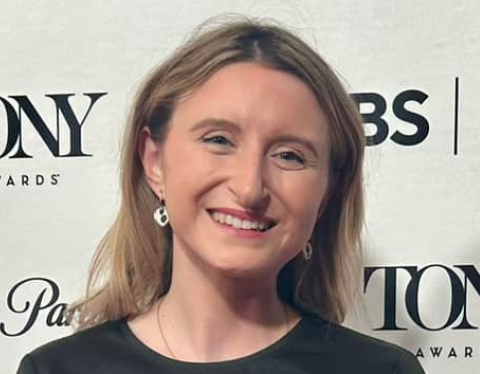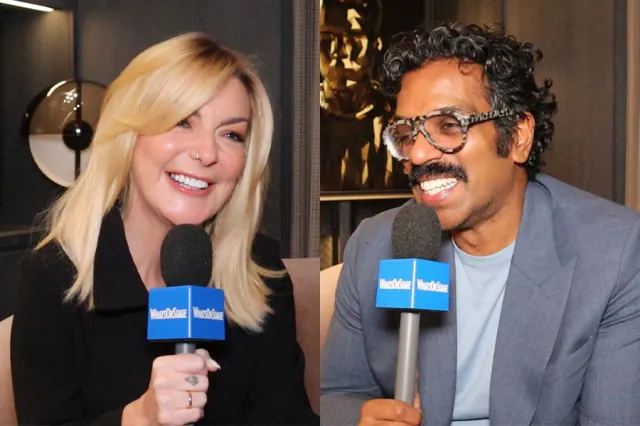James Graham and 160 years of Nottingham Theatre Royal: ‘The theatre has a civic part of being in the community’
He’s joining his local theatre for celebrations!

James Graham has a giant French press of coffee in front of him.
He’s recently returned from New York, where Punch is premiering on Broadway, running concurrently in the West End, as previews started just hours before we video chat. The two-time Olivier Award winner has also been in Plymouth overseeing the first stop of Dear England’s tour, before it opens officially in Nottingham this week.
Oh, also, there are TV and film adaptations of his pieces in the works.
But Nottingham is the reason for our call. The Theatre Royal is celebrating 160 years with a hit play from a local playwright.
“Working the stage door there was my first job in theatre,” Graham says, “God. F**king hell. Like 22 years ago.”
Since then, he’s worked with some of the actors who have passed through the doors, and recalls some of the popstars he met at next door’s Concert Hall: Blondie, Dire Straits, and Will Young stick in his mind.
“I loved it. It was long hours, sometimes 8am till midnight, whenever the show ended,” he says, as the job prepared him for his career in theatre. He remembers Cinderella being that year’s annual pantomime, with actors Bobby Davro and Danny LaRue. “[Danny] was old school; he would slip ten pounds into my hand as he left every day. Brilliant.”

Graham says he feels “so lucky to have been born in Nottinghamshire,” claiming: “I don’t think I ever left in my head, even when my body wasn’t there.”
He grew up in a mining village in the north of the county, where his hit TV show Sherwood is set. “Politically, it’s the borderlands with Yorkshire, and the crucible of all the tension and the violence of the miners’ strike in 1984, and when the Met Police descended.”
He explains: “It really split the villages, and politically it’s always moving. That search for an identity, but not being fundamentally tied to one, is really at the core.”
However, it’s the residents of Nottinghamshire that Graham has the most respect for. “… The people and their humour and their outlook on the world, they’re brilliant,” he laughs, “Sherwood sadly isn’t doing anything for the Nottinghamshire tourist industry, which I regret because it’s one of the most beautiful places.”
Punch, which debuted in the city at the Playhouse, is also based on a local story, of Jacob Dunne and a single fatal punch. “Yes, it’s a tragic story about male violence and drinking culture and going downtown on a Saturday night and what that involves, but it has an extraordinary ending of people being the best versions of themselves and forgiving in an almost superhuman way. And that’s great to tell that kind of story.”
The writer had the same intentions for Dear England. He famously re-wrote the ending for the play’s return based on how England fared in the 2024 Euros.
“I thought, naively, like every England fan, that the stars had aligned,” he says about the games in Germany. But, spoiler alert: “You just have to trust that whatever ending the universe gives you, it will mean something. And I believe, however Gareth Southgate’s story ended, it would mean something and we would have to deal with it.”
Graham, who made a show of saying “I hope the FA are watching” in his Olivier Awards acceptance speech and press, couldn’t believe it when he got a call the next day inviting him out to watch some of the games. His excitement turned to panic as fans began to turn on his hero, but Southgate pulled it back.

The ending he’s landed on is as close to perfect as he could imagine. “It does complete itself. We get to go all the way through to Gareth’s resignation and handing over the torch to Thomas Tuchel, and that feels satisfying.”
While the play is fundamentally about the England football team, “it has serious themes about masculinity and belonging and identity, how you deal with the past, and how you deal with trauma,” Graham explains. “Dear England is unapologetically, in the theatre sense, not the political sense, a populist play.”
He credits his creative team, director Rupert Goold, choreographer Ellen Kane, and designer Es Devlin for helping him achieve that, saying, “it has confident, bombastic feels to it.”
“I always think: ‘What if this is the first play someone ever sees?’ That’s always in my head, whatever the subject matter,” he comments that he didn’t grow up with the theatre, and saw his first play in London in his 20s: “I don’t have an arty family.”
Therefore, he was very aware that it was the football story that attracted thousands of people to see a straight play for the first time in the West End.
This made the opportunity to give the play a regional premiere and a tour even more vital: “I advocated very strongly for it… It’s the national game and it’s the National Theatre. It should go around the nation.”
To celebrate the opening in Nottingham is, for personal reasons, “very satisfying and very moving,” but also opens the conversation about theatre in the regions.
“I can never really find the language that doesn’t sound really patronising, like you’re deigning to share your work with people outside of London. But, it’s the opposite. Growing up outside of London, the only work I got to see was if any producers, commercial or subsidised theatres, took it on the road.”
It’s why Punch opened in Nottingham, Boys from the Blackstuff in Liverpool, and Make it Happen in Edinburgh.
Though he recognises touring as a “struggle in this climate, economically,” he thanks Arts Council England funding for backing the Dear England tour.
Ahead of the 160th anniversary celebrations at Theatre Royal in Nottingham, where Graham is taking part in a pre-show chat, the theatre shared photos from the archive. In them, horse and carriages are slowly replaced by trams and cars. But the theatre has stood tall in the centre of the city, atop a hill.
“I love imagining that all roads lead to the theatre, and the theatre has a civic part of being in the community. It’s like the city is telling you to go to the theatre.”




















